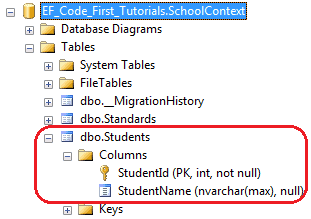Data Annotations - NotMapped Attribute in EF 6 & EF Core
The NotMapped attribute can be applied to properties of an entity class for which we do not want to create corresponding columns in the database.
By default, EF creates a column for each property (must have get; & set;) in an entity class.
The [NotMapped] attribute overrides this default convention. You can apply the [NotMapped] attribute on one or more properties for which you do NOT want to create a corresponding column in a database table.
NotMapped Attribute: [NotMapped()]
using System.ComponentModel.DataAnnotations.Schema; public class Student { public int StudentId { get; set; } public string StudentName { get; set; } [NotMapped] public int Age { get; set; } }
In the above example, the [NotMapped] attribute is applied to the Age property of the Student class. So, EF will not create a column to store Age information in the Student db table, as shown below.

Note: EF also does not create a column for a property which does not have either getters or setters. For example, EF will not create columns for the following City and Age properties.
using System.ComponentModel.DataAnnotations; public class Student { private int _age = 0; public int StudentId { get; set; } public string StudentName { get; set; } public string City { get{ return StudentName;} } public int Age { set{ _age = value;} } }